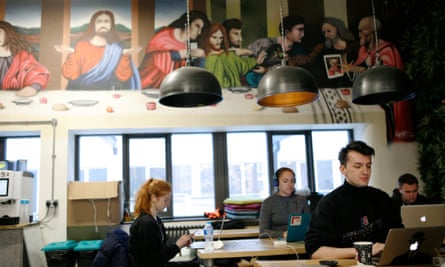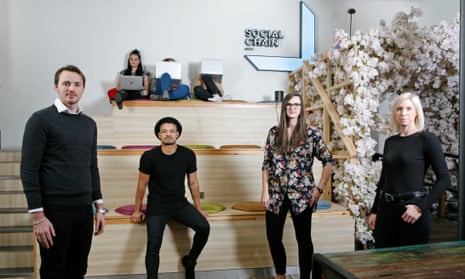On a high wall in the corner of Social Chain’s Manchester office, with a look of serene exasperation, Jesus Christ looks down on the sea of millennials and Generation Zedders (or whatever the dominant term is for the under-20s this month) tapping out tweets and social media stories. The mural, which stretches across the width of the office, is a riff on Leonardo’s The Last Supper. The faces of the disciples at the table, however, are not dipped towards plates of food, but into glowing screens. There’s Luke, gawping at an Instagram story on his phone. There’s Judas, tittering into an iPad. Christ, meanwhile, stands at the centre of the table, flanked by his inattentive followers, shoulders shrugged, palms upturned in part vexation, part resignation.
It’s a fitting mural for this three-year-old startup, not because of the implication that social media turns our gaze from higher thoughts, but because it is, to use a term often heard in Social Chain’s office, relatable. Who hasn’t, at one time or another, played the role of either Jesus and Judas at the dinner table, distracted by the buzzing of their Twitter or Facebook notifications, or silently fuming at a sibling’s unending fascination with the world inside their phone?
For Social Chain, which has, with nosebleed velocity, grown from five staff to almost 200 in the space of two years and now has an annual turnover of £9m, it is a joke on which an empire has been founded. The company’s youthful employees (the head of video production joined at the age of 17) run several hundred of the UK’s most popular social media accounts covering sport, video games, fitness and food. Videos produced here, on a gleaming kitchen set that bakes in the glare of TV studio lights, are now watched more than 4.5bn times a month.
Steve Bartlett, the company’s 25-year-old co-founder, regularly boasts to potential clients that he can make any hashtag – that is, a word or phrase that classifies or categorises the accompanying text in shorthand – trend on Twitter before he’s finished his presentation. For those who work in marketing, it’s not so much a party trick as true magic: arcane, powerful, irresistible. “Traditional agencies have not been able to adapt – or even if they have, the staff there are not native social media users; they’ve had to learn this stuff as adults,” says Bartlett. It’s a compelling pitch. Social Chain’s clients now include Coca-Cola, Fifa and Spotify; one of its most recent recruits came from a senior position at Saatchi and Saatchi.
Hannah Anderson quit her teacher training course in 2014 to become the company’s first employee. On a chilly winter day, she stands in the open-plan staff kitchen (different to the studio kitchen, which is housed in another wing of the warren-like office complex), opposite the exasperated Christ, to address a few dozen employees in a daily “lunch and learn” session. These impromptu lectures are open to anyone – including, it seems, the five dogs that wander the office sniffing at new recruits (four a week at the current rate). The lectures aim to impart something of Social Chain’s culture and rationale (as well as some startling claims, such as: more people own a mobile phone than a toothbrush; 90% of all content online was created in the past 12 months).
Emotion is the fuel that fires virality, explains Anderson. The stronger the emotion that a Facebook post, tweet or Instagram story elicits, the further it will be carried by the churning waves of algorithm, she explains. Content – that icky, catch-all term of the moment for entertainment – only “goes viral” when people share it. And people share feelings, not information. “Low-arousal emotions such as contentment and relaxation are useless in the viral economy,” says Anderson. “They induce humans to close down rather than open up.” If you want to get anywhere in the social-media game, you’re going to need something stronger: frustration, anger, excitement, awe. “There is a lot of science behind all this, you know, and how it connects to human nature and how humans connect with each other,” she says.

To get us thinking about how to make viral content, Anderson splits her audience into four-person teams, each of which is given two sheets of paper. One is labelled with a demographic (our team gets “girls”); on the other, an emotion (“frustration and anger”). Our task is to come up with an idea for a piece of content that will attract angry young women.
“Hmm, what makes girls angry?” asks a teammate.
“Workplace harassment?” I venture.
“Timely!”
“It’s good but maybe a little heavy,” says the third man in our group. “How about: a boyfriend who spends all day playing video games?”
The thinking about the psychology of viral content is relatively new at Social Chain. In the heady, early days, it just came naturally. One night, a few years ago, Bartlett’s co-founder, Dom McGregor, a second-year sports science student at Edinburgh University at the time, returned to his student house after a long night’s drinking to find that he was out of toilet roll. Mournful and tipsy, McGregor set up a Twitter account entitled “student problems”, to share his plight with the world. He began tweeting about the indignities of student life, anything “universally relatable”, he says, and soon had gathered an audience of 5,000 followers.
Meanwhile, in Manchester, Bartlett had just dropped out of a course in business management after a single lecture (“My mum didn’t speak to me for 18 months”). Incredulous that, in 2013, universities still used physical noticeboards rather than online ones, Bartlett developed an idea he called Wallpark, a network of web noticeboards, each one specific to a different British university. With a modest sum of investors’ money, he began buying online ads and posting flyers around Manchester, trying to encourage students to use the nascent service. The results disappointed. Then Bartlett came upon McGregor’s student problems Twitter account and had an idea: what if he could advertise his website directly to its followers?
Bartlett and McGregor met up at a bar in York (McGregor wore suit and tie) and Bartlett made his pitch. McGregor quit his course and the pair began posing as students, holing up in library rooms at Manchester University, where, if they arrived early enough, no one would check their IDs. Bartlett’s hunch proved correct. One post about Wallpark on the student problems account drove more traffic to his website than everything else he had tried put together. A magical strategy revealed itself: if Bartlett could persuade other people in the UK who owned popular social media accounts to join him, they could build an untapped audience to which he could market, not just Wallpark, but, potentially, anything.
“A follower was worth nothing,” says Bartlett. “Nobody recognised the value, including the people who owned these accounts.” Hannah Anderson was an exception to the rule. She ran a Harry Potter-themed account titled Hogwarts Logic. It was essentially a fan page, but one infused with wit (example: “On a scale of 1 to Horace Slughorn turning into an armchair to fake his own death, how good are you at avoiding your responsibilities?’). Anderson also had half a million followers.
One day she received a direct message from McGregor: ‘‘Hey man. Love the page.” He then offered to buy the account for £1,500. “At the time I was like, God, £1,500? I’m a poor student and that’s a lot of money,” she says. But she believed it was worth more, and not just in financial terms. “When a Harry Potter pun I’ve written gets 5,000 retweets it has the same effect on your brain as, I imagine, when a standup comic plays an arena show,” she says.” Giving up the venue she had built was unthinkable. Anderson replied to McGregor, suggesting that there might be another way to work together.
“When we met, it was clear that she fit the bill,” says McGregor. “She was young, and not tied down in a way that, say, a 45-year-old might be.” In early 2014, Anderson left Northumbria University to join the team.

That year the trio set up hundreds of new social media accounts designed to quickly attract a following. “We’d try an idea like, say, student life hacks. We would write 10 funny posts about, say, how to save money, or how to eat cheaply, then share those posts on all of our other pages and see what the response was like.” Indifference was not tolerated. Within 60 seconds, Bartlett says, you can tell whether a post is going to go viral or not. Without a sufficient engagement, the post gets deleted. “Nine times out of 10 the accounts wouldn’t work out. So we’d try again. Maybe four or five accounts each, every day.”
An early victory came when McGregor received a message from a game developer via Facebook. He had designed a new mobile phone game, Tippy Tap, and needed some help getting word out, but had no budget. The team turned down the offer to work for nothing. But when Bartlett began playing the game in a local bar, he found he couldn’t stop. A 50-50 revenue-split deal was agreed and McGregor and Bartlett put their new knowledge to work. “Everyone was advertising their mobile game with words like ‘fun’ and ‘wonderful,’” says Bartlett. “We had already figured out that messages only travel when they make you feel strong emotions. ‘Fun’ doesn’t make anyone feel anything. So we created a story about the game being horrendously frustrating, using photographs of smashed phones.” In just 13 days Tippy Tap passed 2m downloads.
Bartlett and McGregor chose to reinvest the funds by approaching the owners of social media accounts that had a large following, just as they had with Anderson. “We wanted every person in the UK that owned a large social media page to work here,” says Bartlett. Behind the accounts they invariably found young, funny people who loved what they were doing, but didn’t know how to earn money from it. “They all wanted to professionalise, because of parental pressure, or what have you. We provided a place where a hobby could become a career.”
The deal was simple: come to Social Chain, work at the office, and just do what you were already doing. “I could never tell Nick Speakman, who runs Sporf [a football channel with more than 15 million followers] what to tweet,” says Bartlett. “These assets are just an extension of a person. It’s an extension of a personality: it’s her humour, her touch, the way that she writes. You don’t mess with that.”
The only proviso was that, every now and again, the owner of the account would be asked to take part in what became known at the company as a “thunderclap”. This is the moment at which a marketing tweet or post is posted across every one of the company’s social media accounts at once. Each account is free to frame the advert in language relevant to its subject and style, but a consistent hashtag unifies the effort, driving the term up the all-important trending list.
Medieval Reactions, one of Social Chain’s most enduring Twitter accounts, which posts renaissance paintings alongside captions themed around the modern world, shows how the technique works. One recent post reads: “I’m not going to fall for Black Friday this year and buy some unnecessary shit.” Below is a painting of a priest clutching a sceptre in one hand and in the other a crimson rope tied to a tiny pet dragon. Below this post, which has thousands of retweets, sits a marketing nugget – a suggestion that readers enter a competition to win £500 of Superdry clothing. The fact these tweets are marketing is signalled by the hashtag #ad (a legal requirement). When this message is sent to three or four hundred massive accounts, it triggers the “thunderclap” moment. Twitter’s algorithms notice the hashtag, and promote it, thereby generating yet more engagement. It’s a way of gaming the system that has proved astonishingly effective. “That’s the beauty of it really,” says Katy Leeson, Social Chain’s managing director. “The message is always tailored to the audience, but the hashtag is the same.”

Currently, Social Chain’s services cost anywhere between £10,000 and £50,000 per month, depending on the type of service required. But the ground shifts constantly in the social media world, and today’s winners can easily disappear into the cracks. Platforms may, without any notice, change the way that their algorithms work to promote one kind of content over another (Social Chain has an internal channel to which anyone can post news snippets about such changes, with rewards for those who find the information first). While the business was built on Twitter, most of the company’s work now takes place on Facebook and Instagram. “People don’t go to Twitter to follow a parody account any more, you go on there when something’s happened in the world and you want to know more.”
Facebook, which until recently was considered the social media network for parents, is, week by week, becoming the dominant platform on the web. “Facebook’s just winning all the time when it comes to getting people to spend all of their time in their ecosystem,” says Anderson. “They’re very switched on and they listen to their users carefully. Generation Z have been born into this world. Leaving Facebook is too much for many of them. If we’d stuck on Twitter, we wouldn’t be here any more.”
Today Social Chain, which in January splintered into two companies, one of which works as an agency, the other as a media publisher, continues to grow at fearful speed. “There’s a huge insecurity among Gen X marketing directors and even millennial social media managers that they don’t understand what their Gen Z social audience thinks or cares about, so Social Chain looks culturally on the pulse in comparison,” says Michael Barnett, special projects editor at Marketing Week, of the company’s quick growth. Throughout the building in Manchester, where the firm started out as a single desk in a co-sharing space, workmen toil as if laying track for a speedily oncoming train, renovating various wings and offshoots to house all new design, video and content production departments. It has the brightly coloured, kindergarten-like ambience of a California startup: in one corner a slide descends from a sponge‑floored playroom.
The genial atmosphere obscures the fact that Social Chain is turning human emotion into a saleable commodity. There is much to be angry about in the world today, but when we understand so little about the psychological effects of what happens when our emotions are amplified en masse, is it right to exploit that for money? “I never really thought about it,” says Anderson. “I don’t think we’d ever do it in an immoral way, if that makes sense? I am concerned with the audience and I do believe we have a responsibility. The impact that we can have is quite scary when you think about it.”
Where is this going? I joined Twitter in 2009, and have seen a shift in tone from lightheartedness to a kind of weaponised outrage that runs across almost all social circles. No one company or individual is responsible for this change, but long term, if the most effective way to engage humans online is to rile them up, doesn’t anger become the dominant mode of our online existence – even if it’s just a Facebook poll over whether you have gherkins in your burger or not?
“I don’t think Facebook would allow that to happen,” says Anderson. “They want people to feel happy while on their platform. Twitter’s more of a free-for-all. I think they need a bit more control on there, because it gets ridiculous. Some things that you get retweeted on to your timeline, it’s like, I don’t want to see that.”
There’s also the question of whether the company’s clients are in for the long haul. According to Marketing Week’s Barnett: “Many marketers don’t really know how to quantify what they’re getting in terms of hard success measures from social media influencers – in other words, increased sales – so there’s a danger one day that brands will move away from doing this if they can’t substantiate the return on investment.”
Then there are the tectonic risks. As the identity of social media platforms changes, there is the old risk for any startup that rapid growth eradicates the character and ambience on which its success is founded. It’s a phenomenon with which Bartlett is obsessed. “I recently met Steve Wozniak [the co-founder of Apple],” he says. “I got one question but I just couldn’t decide what to ask. When the time came, I asked him what question I should be asking him. His reply has stayed with me. He said: ‘How do I keep our company’s specialness as it grows?’”
Now, whenever someone new joins, the entire company gathers around and listens to the new recruit’s story. The company’s culture officer buys flowers and cakes to mark every employee’s birthday and anniversary. “Wherever I am in the world I call in to mark an anniversary,” Bartlett says. “Those small things are the most important things because, over time, they culminate to define you.”
He rejects the idea that such gestures are cloyingly sentimental. “I would never work for anyone else, so there’s a part of me that can’t understand why anyone would work for me,” he says. “I overcompensate. Young people have so many options right now. They could start an Instagram business in their bedroom, so how do we convince them to stay?” The same way Social Chain persuades people to stay on social media, perhaps. Wonder and awe.

Comments (…)
Sign in or create your Guardian account to join the discussion